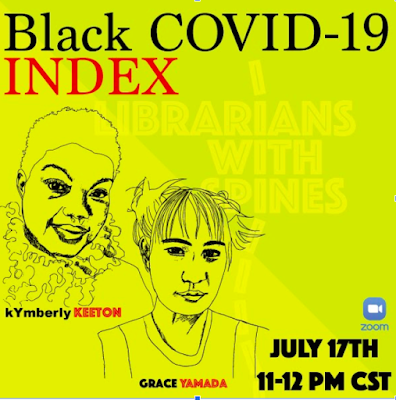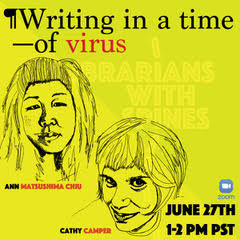Posts
Showing posts with the label #WeNeedDiverseBooks
Librarians with Spines Vol. 1 Now available as an Ebook!
- Get link
- X
- Other Apps

I am so proud to announce that Librarians With Spines: Information Agitators In An Age Of Stagnation (or Vol. 1), is now available in an E-book format. The e-book can be found on Amazon, and is responsively formatted, so you can control the font size, etc. with your e-reader. HINCHAS Press is working hard to bring you Vol. 02 in an E-book format by this fall and we plan on publishing Vol. 03 as a print and E-book format together. If you are interested in submitting an abstract or an idea for a chapter in the next book, or as an author on a blog post here, please email Max at librarianswithspines@gmail.com . Librarians With Spines E-book
Recording of Librarians with Spines Author Showcase #2: Grace Yamada interviews kYmberly Keeton.
- Get link
- X
- Other Apps

Librarians with Spines Author Showcase 2: Grace Yamada Interviews kYmberly Keeton
- Get link
- X
- Other Apps

Come hear and interact with two Librarians with Spines: Grace Yamada Interviews kYmberly Keeton about the Black Covid 19 Project, about Hip-Hop and Information Science (kYmberly's chapter was on this) . The conversation will be sure to include aspects of digital citizenship (Grace's chapter was on this topic), books, libraries and more. More about the Black Covid-19 Project: Keeton--Austin History Center's African American Community Archivist and Librarian was instrumental in organizing and launching Growing Your Roots, the four-day statewide African American genealogy conference earlier this year. But in this case, Keeton is all about the present – specifically about African Americans living through this same pandemic that's sending the AAABF to Zoom this year. She believes their stories matter, and she's collecting them for the Black COVID-19 Index , an independent project she initiated to gather stories, images, audio, and video created by Africa...
Recording:Librarians With Spines Author Showcase One: Ann Matushima Chiu and Cathy Camper
- Get link
- X
- Other Apps

Librarians with Spines Author Showcase: Ann Matsushima Chiu and Cathy Camper 6/27/20
- Get link
- X
- Other Apps

Please join us for a conversation with Ann Matsushima Chiu and Cathy Camper on 6/27/2020 from 1-2 pm on Zoom! Both Ann and Cathy Camper were chapter authors in Librarians with Spines Vol. 1. Interviewers: Autumn Anglin, Yago Cura, Max Macias. This event is free. Add caption Please fill out the form below to register for this exciting event. We are requiring registration to avoid unwanted visitors and other forms of Zoombombing. Once you are registered, we will send you the login information. Loading…
Whiteness in Libraries
- Get link
- X
- Other Apps

Whiteness in US Libraries [Note--this is a blog post. These ideas can and will be further developed. These ideas are sketches of what I am thinking at the moment. Feedback is encouraged and welcome.] US schools and libraries serve as points of diffusion for Whiteness. Whiteness, as used in this post is defined as the concept that European people and European culture are more important than other people and other cultures. Whiteness is purveyed uncritically in libraries. This shucking of Whiteness is done under the guise of objectivity, of adhering the the 'marketplace' of ideas. But this so-called neutrality is really an adherence and capitulation to the Whiteness paradigm. Children of color hear the message of Whiteness--"European people and European culture are more important than other people and other cultures. Children of color live in a world of discrimination and bias in US schools. Some t...
Problems in Multcultural Collection Development and Some Remedies
- Get link
- X
- Other Apps
Guest Interview for a Multicultural Library Science Class
- Get link
- X
- Other Apps

Yes, that is a Grumpy T-shirt. Here is a link to an short interview I did for a multicultural librarian graduate course: https://goo.gl/r93L4g These are the questions I covered: Questions for 825 Interviews 1. Will you please introduce yourself to the class and briefly describe your current library and position as well as the path that led you to librarianship? 2. In this course, we are exploring how libraries can best meet “the recreational, cultural, informational, and educational needs of African American, Asian American, Latina/o, Native American, and bi/multiracial children, young adults, and adults.” In what ways does your racial/ethnic identity enable you to meet these needs in your library? 3. As a patron in libraries throughout your life, you have probably had both positive and negative experiences related to access and collections. How have these experiences shaped your work as a professiona...
#DiversitiesAndRepresentation
- Get link
- X
- Other Apps
[We welcome this week's guest post from Da` Lyberri-Ann] By: Da’ Lyberri-ann So another Midwinter has passed and like red carpet season, our new literary award winners have been announced with great fanfare. Facebook was filled with selfies and group pictures of committee members proud of a year’s hard work and accomplishments. As a librarian I should feel giddy and excited. New books are winning awards for outstanding literature in many different categories. As a children’s librarian I should be pulling out rolls of golden stickers to note these books of honor and proudly promoting them to my community. But I am not excited or proud. I’m upset. Disappointed. Dare I say “pissed off?”. Why? it is because again I see that although #blacklivesmatter for sound bites in the news, it doesn’t result in actual change. At the risk of pointing out the pink elephant in the room I’ll tell you why: The Caldecott committee didn’t have any people of disadvantaged minority status. ...
Lowriders In Space (Book Review)
- Get link
- X
- Other Apps

How do we get kids to read--especially those that appear to not be interested in reading? Reading! The answer is: find relevant material that the reader can empathize with and that the reader can understand. Back cover of book An adventure making something out of the best of what you have is something ANY kid can empathize with, but the subject matter is most definitely something young Chicanos can relate to and understand. Cars, space, excitement and fun make this dynamic story a great read young readers. This is not to stereotype young Chicanos, we are far more diverse than lowriders, but many of us grew up in Lowrider Culture and love and understand this culture. The language and characters are fantastic, but rooted in Chicanismo. Cathy Camper and Raul The Third have developed friendly, characters who speak much of the vernacular I grew up with as a 3rd generation Chicano in CA. ...